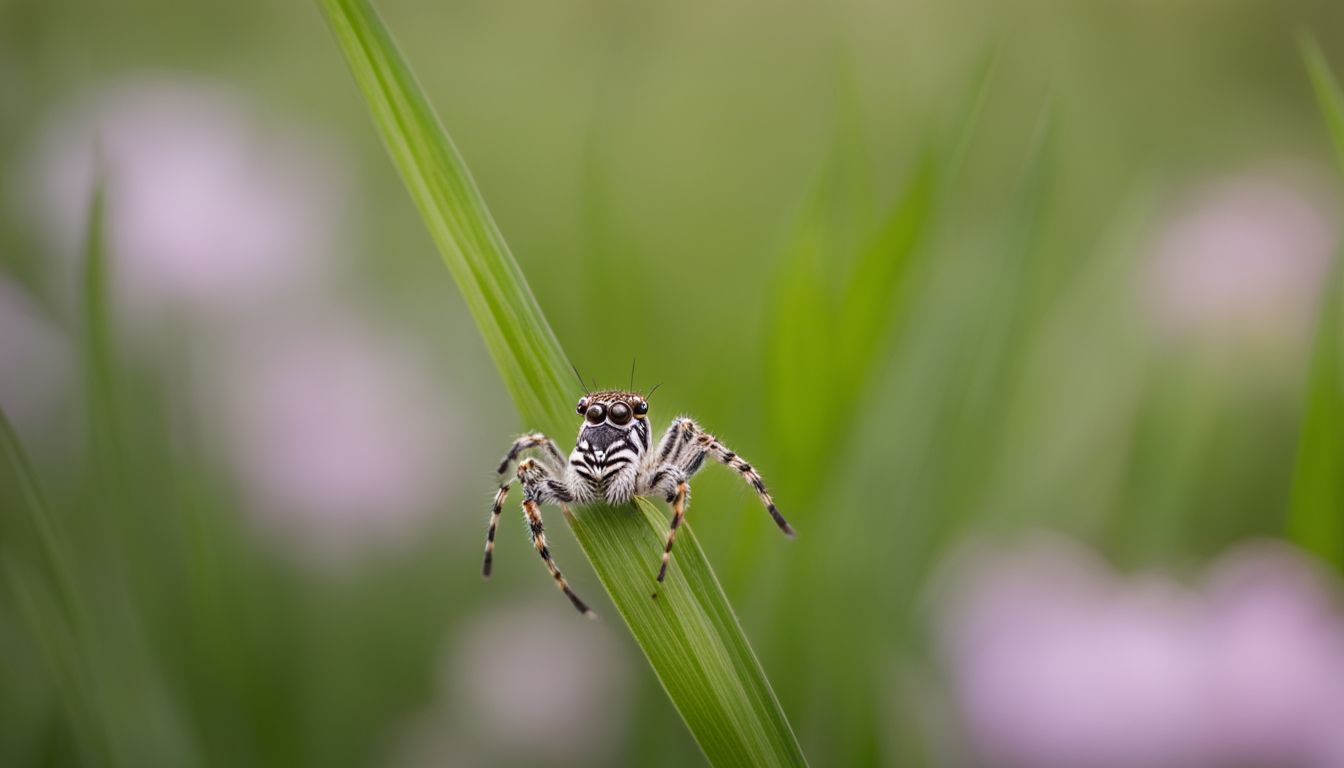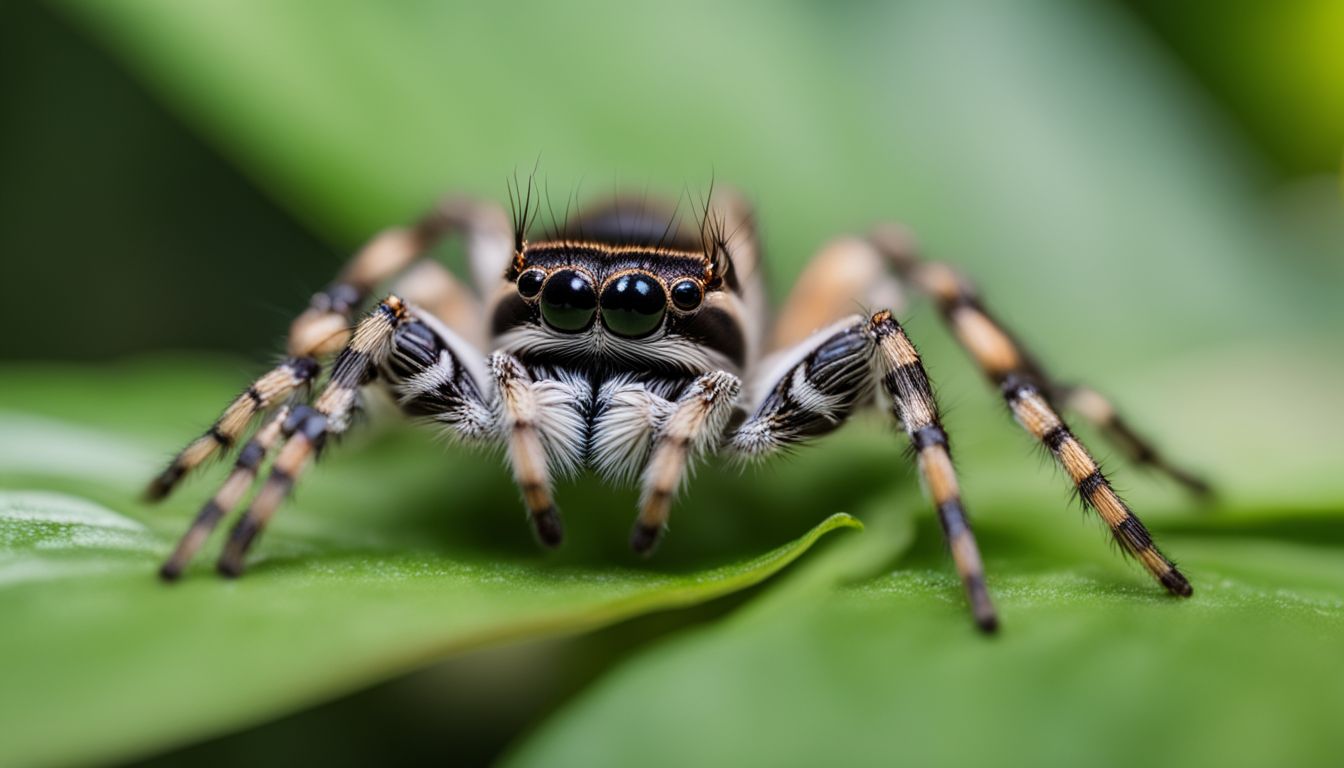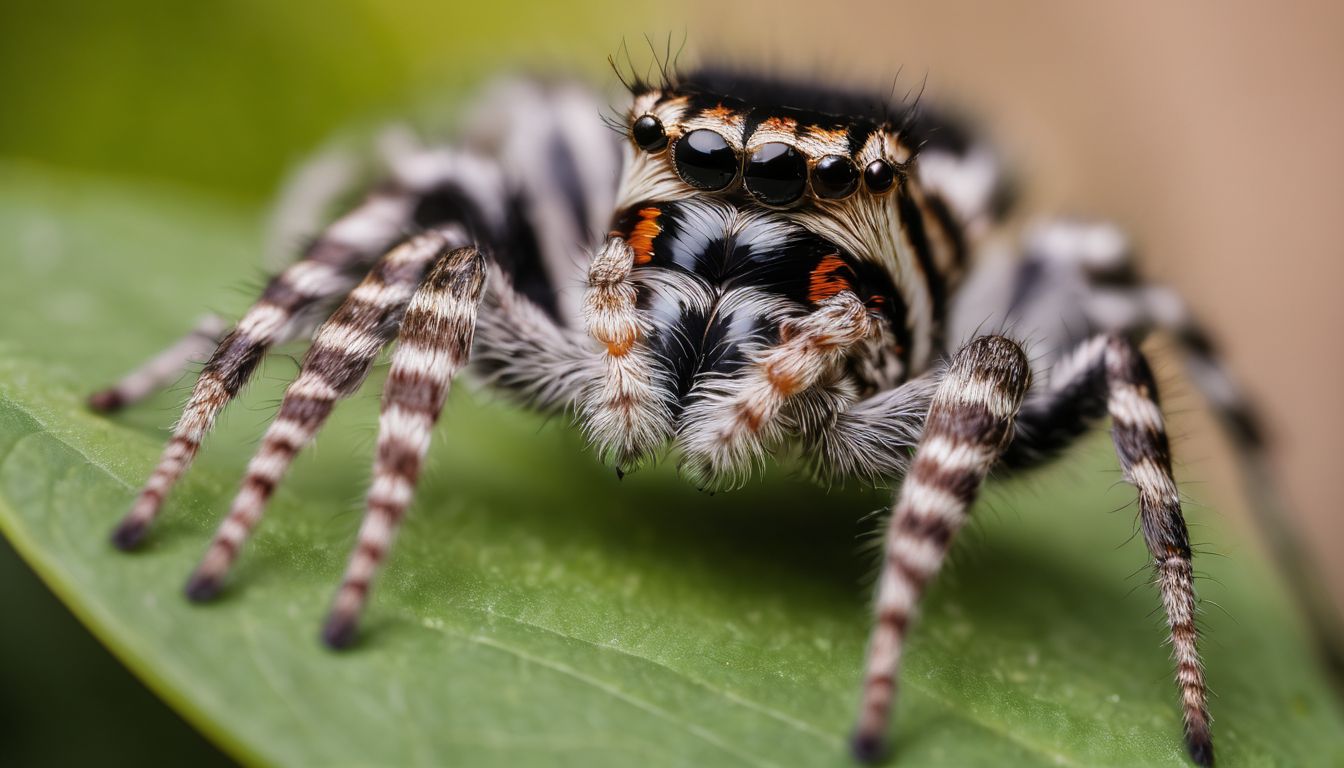Have you ever come face-to-face with a zebra spider and wondered if their bite is harmful? These spiders, named for their distinctive black and white stripes, spark curiosity and sometimes worry.
This post will unwrap the mystery behind zebra spiders’ venom and offer peace of mind about these small arachnids. Keep reading to discover why there’s no need to fear these striped jumpers!
Key Takeaways
- Zebra spiders are not poisonous to humans and their bites are generally harmless, causing mild symptoms such as redness, itching, and swelling at the bite site.
- Although zebra spiders possess venom, it is not highly toxic and typically only causes minor discomfort with no long-lasting effects on humans.
- Seek medical attention if severe symptoms like difficulty breathing or chest pain occur after a zebra spider bite. Most times, these non-aggressive spiders do not pose a significant threat to human safety.
- Zebra spiders play a vital role in the ecosystem by preying on small insects like aphids and contributing to natural pest control in gardens and agricultural settings.
What is a Zebra Spider?

The zebra spider, also known as Salticus scenicus, is a type of jumping spider commonly found in the Northern Hemisphere. It is easily identifiable by its black and white striped pattern, making it stand out among other spiders.
Scientific Classification
Zebra spiders are fascinating members of the spider world due to their unique black and white striped pattern. Let’s explore their scientific classification.
| Classification Level | Name |
|---|---|
| Kingdom | Animalia |
| Phylum | Arthropoda |
| Class | Arachnida |
| Order | Araneae |
| Family | Salticidae |
| Genus | Salticus |
| Species | scenicus |
Salticus scenicus is the scientific name for the zebra spider. They are part of the Salticidae family, which is known for the jumping spiders. These creatures have a precise taxonomic hierarchy that relates them closely to other arachnids.
Physical Description and Identification
Zebra spiders are easy to spot with their black-and-white stripes. These small spiders have sturdy bodies and measure around 5 to 7 mm long. They often hang out on walls, fences, and windows in cities.
Their legs aren’t very long but they sure can jump! The zebra spider’s strong back legs help it leap when it pumps blood into them.
You’ll see these spiders doing amazing jumps to catch bugs like flies and mosquitoes. Their fantastic eyesight helps them spot prey from a distance before bouncing closer for the catch.
Now, let’s find out about the venom of a zebra spider and what happens if one bites you.
The Venom of a Zebra Spider

Zebra spiders do possess venom, but they are not considered to be a threat to humans. The symptoms of a zebra spider bite are generally mild and similar to those of other non-venomous spider bites.
Understanding Zebra Spider Venom
Zebra spiders make a poison in tiny glands inside their mouth parts. This poison is not very strong and doesn’t hurt people much. If they do bite, it might hurt a little, but you won’t get sick or have big problems because of it.
They are small, so their bites are not deep or very harmful. Most times zebra spider bites don’t need special care from a doctor.
After talking about the venom, let’s see what happens if someone does get bitten by a zebra spider.
Symptoms of a Zebra Spider Bite
After understanding the venom of a zebra spider, it’s important to know the symptoms of a bite. Here are the signs that may occur:
- Redness at the site of the bite
- Itching and irritation
- Stinging sensation
- Swelling around the bite area
Are Zebra Spiders a Threat to Humans?
While zebra spiders do possess venom, they are not considered a threat to humans. Their bites are typically harmless and may only cause mild irritation or discomfort. However, it’s important to seek medical attention if any severe symptoms occur after a zebra spider bite.
Comparing Venom Potency to Human Safety
Zebra spiders are not poisonous to humans. Their venom is not considered highly toxic and their bite typically causes only mild discomfort with no long-lasting effects. Unlike some other venomous spiders, zebra spider bites do not result in severe pain or neurotoxic effects.
In summary, zebra spiders pose minimal threat to human safety due to their non-dangerous venom and non-aggressive behavior.
When to Seek Medical Attention
If you experience severe symptoms such as difficulty breathing, chest pain, or a severe allergic reaction after being bitten by a zebra spider, seek medical attention immediately. Here are some indicators that you should get medical help:
- Persistent and worsening pain or swelling at the bite site.
- Development of red streaks leading away from the bite.
- Symptoms such as fever, chills, nausea, or vomiting.
- Signs of an infection at the bite site, like pus or increasing redness.
- Any unusual or concerning reactions beyond mild discomfort and localized symptoms.
Zebra Spiders in the Ecosystem
Zebra spiders play an important role in the ecosystem by preying on small insects like aphids, helping to control their population. They are efficient hunters and contribute to natural pest control in gardens and agricultural settings.
Do Zebra Spiders Eat Aphids?
Zebra spiders eat aphids. They primarily hunt smaller spiders and other arthropods as part of their diet. They play an important ecological role as predatory spiders that eat large numbers of insects and other arachnids in the ecosystem.
Preventing and Treating Zebra Spider Bites
To avoid zebra spider bites, carefully shake out clothing and shoes before wearing them, and if bitten, clean the area with soap and water and apply a cold compress; for more tips on preventing and treating bites, continue reading.
Tips for Avoiding Bites
- Wear long – sleeved clothing and gloves when handling outdoor debris to limit exposure to zebra spiders.
- Clear yard debris, such as woodpiles and leaf litter, where zebra spiders may hide and build their nests.
- Properly seal and insulate homes to prevent zebra spiders from entering indoor spaces.
- Use natural repellents like citrus oils or vinegar to deter zebra spiders from nesting in and around the home.
First Aid for Zebra Spider Bites
If you get bitten by a zebra spider, follow these steps to provide first aid:
- Wash the area with soap and water to clean the bite.
- Apply a cold pack to reduce swelling and pain. Keep it on for at least 15 minutes.
- Seek medical help if there’s severe pain, redness, or swelling near the bite.
- Avoid scratching the bite to prevent infection.
Conclusion
In conclusion, zebra spiders are not poisonous to humans. Their venom is not strong enough to cause much harm even if they bite. While their bites can be painful, the pain typically goes away after a few hours.
Therefore, there’s no need to fear these tiny striped arachnids. Remember, zebra spiders may look striking with their black and white stripes, but they pose no significant threat to humans.
To learn more about the role of spiders in controlling aphid populations, visit our page on whether spiders eat aphids.
FAQs
1. What is a zebra jumping spider?
A zebra jumping spider is a small, black and white striped spider that can jump far to catch its prey.
2. Are zebra spiders poisonous to humans?
No, zebra spiders are not dangerous to people. They might bite if they feel trapped, but their bite doesn’t hurt much.
3. How do zebra spiders hunt for food?
They use their excellent binocular vision to spot prey and then leap on it suddenly.
4. Do zebra spiders have a special way of attracting mates?
Yes, male zebra spiders perform a courtship dance using their front legs and body movements to impress females.
5. Where do baby zebra spiders come from?
Mother zebra spiders lay eggs in sacs, and when the spiderlings hatch, they look like tiny versions of adults.
6. Can you tell me how big Zebra Spiders usually get?
Zebra Spiders are pretty small; most grow only about the size of a pea!




